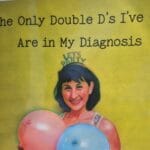
Tell us about your experience with ADHD
When were you diagnosed, or suspect that you had ADHD? How has it impacted your life?
I was diagnosed twice throughout my life. The first time was when I was about 7, through a recommendation from my first-grade teacher. At the time of the diagnosis, my mom was not properly informed about ADHD, which left me not knowing I had it until I was 17. When I suggested to my mom that I would like to be assessed for it, which is when she revealed I had been tested and diagnosed when I was a child. I was reassessed in 2024, at 19, when I especially felt the full impact of ADHD through my first and second year of university. The way it had impacted my life was that I was able to realize that everything I was going through, which I did not know were symptoms and felt so difficult to function at times, was actually something bigger. Providing that label to the years of questioning has allowed me to understand myself better and have access to resources that can help me succeed at what I want to do. I don't think of it as something I am cursed with; I understand that my brain functions a certain way, and that is who I am. It felt like clarity and was one step to understanding who I am.
What has been the biggest challenge living with ADHD?
This could be in school, work, relationships, your mental health, etc.
I think wanting to achieve so much but not having enough energy, focus, or time management to do so. I do accomplish my goals, even though sometimes I do them right up to the deadline, or I forget about something important. The forgetfulness is hard as well, especially when I get distracted with another task and completely forget what I was doing or where I placed the object I had previously. Trying not to get overwhelmed when there is a lot to do, and the executive function can make tasks and days more difficult if I do not allow myself a break or check in on myself. I do pick my fingers, arms, and scalp, not bad, but it is something I do unconsciously as a form of fidgeting. I think change is also really hard, especially when you move to a new location, and getting used to the new area and routine is very difficult as well. I think the fact that I panic easily, too, such as when there is not enough time on a quiz for me to complete something, or if I simply cannot find a food item in the fridge. It varies from day to day, depending on whether I got enough sleep, my stress levels, if I took medications, and if I ate too. The anxiety and racing thoughts that I have at times make it hard to concentrate or fall asleep at times.
What strengths or unique qualities do you associate with your ADHD?
Is there something about how your brain works that you appreciate or celebrate?
With the heavy attention to detail and wanting to do everything to the best of my ability, I will work on a task until I am satisfied with the result. I also look at things in a different way and am consistently curious about everything I do. The hyperfocus, as well, is a gift sometimes, especially if it is something that I am fully committed to. The ability to be creative and have a strong imagination is useful when working on a project, too. Once I see something I want to create or even a place I want to go, I do it (which is also impulse control, but in this way it is more positive). It makes up my outgoing and talkative personality as well. I have participated in drama productions in high school to deliver speeches in front of crowds. It allows me to have a more open personality and be there for someone who may not be as comfortable as I am in certain situations. I am very much a risk taker in some ways, such as going on an exchange to Ireland for 4 months by myself and learning new things about myself that I wouldn't have if I did not go. If I did not take that leap, I knew I would regret it for the rest of my life.
How has your identity (age, race, gender, culture, etc.) shaped your experience with ADHD?
Feel free to reflect on how ADHD intersects with other aspects of who you are.
Since I am a woman, we tend to be underdiagnosed due to us presenting symptoms differently from men or boys at a young age. Even though I was diagnosed at the age of about 7, the doctors gave my mom little information or choice on how to help a child with ADHD, besides prescribing medications. Due to this lack of information and not wanting to put a 7-year-old on stimulants, my mom had no idea what to do or what ADHD even was. Through my development, I excelled in school and showed no signs of concern, which is why she never followed through with anything else besides what the doctors told her originally. Due to a lack of information and options presented to my mom, there may have been a better explanation for the things I was feeling as I grew up. My ADHD gives me my loud and expressive personality that makes me who I am and allows me to keep varying interests and determination towards the things I love. It gives me my determination and commitment to the things I enjoy doing, as well as giving me the ability to just do something without thinking twice about it (especially if it's something I want to achieve).
What do you wish more people understood about ADHD?
What myths or misconceptions would you love to bust?
It is much more than the typical hyperactivity or lack of focus that the majority of people think of. Just because you aren't what is typically thought of for ADHD, does not mean that someone could not have it. Having to explain the time blindness, the procrastination, the anxiety, the overstimulation, and feeling frozen to the point you can't move, these are only some things. As well as it presents differently in girls than in boys, who are typically assumed to have it. That I don't do things on purpose, such as being late, and that actually I am very aware of if I am late to something and begin to panic surrounding it. Having to consistently explain what is happening inside my head or the reason I do something a certain way because I have to, or my behaviour can be exhausting at times, especially when people think of ADHD as the typical stereotype. ADHD is more than just hyperactivity; it is the way someone's brain functions and is unique to everyone.
What has helped you the most in managing or embracing your ADHD?
This could include tools, therapy, community, mindset shifts, medication, etc.
Occupational therapy has helped me realize what works for me and what does not. It has helped me understand ADHD better and what I need to ensure that I can have a productive day. I think also giving myself grace (being kind to myself) or not being so hard on myself came as a result of this. I do hold myself accountable when I do not complete something because I was off doing another unimportant task, but I realize I am doing the best I can and may just need to approach this important task in a different way that allows my brain to find it easier to do. To motivate myself is very hard, but if I do a small, simple task before, I can tackle the next task right after. Medications have helped a lot, I feel less scattered brain, I can focus for longer periods of time, and I am not as tired as before, but they are definitely not for everyone. Some medications work better than others, and each has its own side effects. Understanding that I need a routine to function allows me to hold myself to that and not feel overwhelmed about everything that is coming in the future. Having a supportive community helps, and those who understand me allow me to thrive and learn in new environments. They have helped me not be afraid of doing things I want, provided me with more confidence, and supported me through days that may be difficult. Understanding if something is too much or if you need help is very important as well. Do not be afraid to ask the people around you to explain or guide you through something. Lastly, one thing that has especially helped me is understanding what works for me and what doesn't, always finding new ways to do things that can help me accomplish what I need.
Why do you want to share your story during ADHD Awareness Month?
What motivates you to speak up now?
I think the stigma or lack of understanding of what it actually is, as well as the lack of focus and information the medical field has on women, too. For those people who remain undiagnosed and confused about why they function differently from others. I have had friends, many of whom are women, come to me asking questions related to ADHD because they are questioning whether they have it or not. To the parents who were not informed properly by medical practitioners and want to do what's best for their child. For years of my mom said over and over again that she did not realize exactly what ADHD was, or was not given other options at the time, she was left clueless for years. Lastly, for my nana, who is very similar to me in many ways and experiences the same things that I do, many I receive from my ADHD. It is okay to have ADHD; it makes you who you are. Just have patience with yourself.

This ADHD Awareness Month, CADDAC is highlighting... Read More

This ADHD Awareness Month, CADDAC is highlighting... Read More

This ADHD Awareness Month, CADDAC is highlighting... Read More

This ADHD Awareness Month, CADDAC is highlighting... Read More

This ADHD Awareness Month, CADDAC is highlighting... Read More